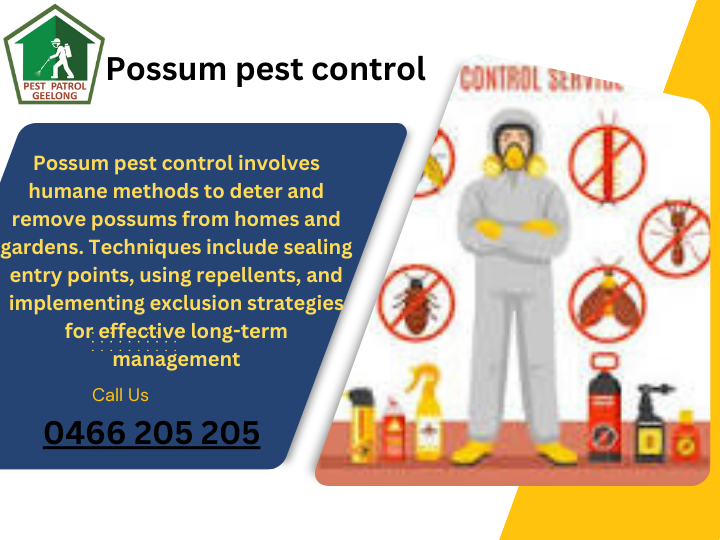Possums are adorable and iconic Australian marsupials, but when they invade your property, they can become a nuisance. From rummaging through garbage bins to nesting in roof spaces, possums can cause damage and create disturbances. Controlling possum populations requires a combination of humane methods and preventative measures to ensure they stay away from your home without causing harm. In this article, we’ll explore 10 effective tips for controlling possums and maintaining harmony between humans and wildlife.

1. Identify Entry Points
The first step in possum control is to identify how they’re accessing your property. Inspect your home for any openings or gaps in the roof, walls, or foundation where possums could enter. Common entry points include broken vents, gaps in eaves, and uncapped chimneys. Once you’ve identified these entry points, seal them off using wire mesh or other sturdy materials to prevent possums from gaining access.
2. Trim Trees and Foliage
Possums are excellent climbers and often use trees and overhanging branches to access roofs and other structures. To deter possums from entering your property, trim back tree branches that are close to your home. By removing potential pathways, you make it more difficult for possums to reach your roof and other vulnerable areas.
3. Secure Garbage Bins
Possums are attracted to food sources, including garbage bins. To prevent possums from rummaging through your trash, invest in secure garbage bins with locking lids. Make sure to keep bins tightly sealed and avoid leaving food scraps or pet food outside, as these can also attract possums and other pests.
4. Install Motion-Activated Lights and Sprinklers
Possums are nocturnal animals and are often deterred by bright lights and sudden noises. Install motion-activated lights or sprinklers around your property to startle possums and discourage them from hanging around. This humane method not only deters possums but also helps to enhance security around your home.
5. Use Natural Repellents
Certain scents and tastes are unpleasant to possums and can be used as natural repellents. Sprinkle ammonia-soaked rags or place bowls of vinegar near entry points to deter possums from entering. Additionally, spreading chili flakes or pepper spray around vulnerable areas can help deter possums without causing harm.
6. Provide Alternative Shelter
Possums often seek shelter in roof spaces and other enclosed areas. By providing alternative shelter options, you can encourage possums to relocate without resorting to more drastic measures. Install possum boxes or nesting boxes in trees away from your home to offer possums a safe and comfortable alternative to your roof.
7. Install Possum-Proof Fencing
If possums are regularly entering your yard or garden, consider installing possum-proof fencing to keep them out. Use sturdy wire mesh or netting to create a barrier around your property, making sure to bury the bottom of the fence underground to prevent possums from digging underneath.
8. Use Decoys and Visual Deterrents
Possums are territorial animals and may be deterred by the presence of predators or other possums. Place decoy predators such as plastic owls or snakes around your property to create the illusion of danger. Additionally, hanging shiny objects like CDs or aluminum foil strips can help deter possums with their reflective surfaces and unpredictable movements.
9. Employ Trapping and Relocation
As a last resort, trapping and relocating possums may be necessary if other methods prove ineffective. Use live-capture traps baited with fruit or vegetables to capture possums humanely. Once captured, relocate possums to a suitable habitat away from residential areas. Be sure to check local regulations regarding the trapping and relocation of possums, as permits may be required in some areas.
10. Seek Professional Assistance
If you’re struggling to control possum populations on your property, don’t hesitate to seek professional assistance from licensed pest control experts or wildlife management professionals. These professionals have the experience and resources to safely and effectively manage possums and other wildlife while ensuring compliance with local regulations and ethical standards.
Conclusion
Controlling possum populations around your home requires a combination of preventative measures, humane deterrents, and, if necessary, professional assistance. By identifying entry points, securing food sources, and implementing deterrents, you can encourage possums to relocate without causing harm to the animals. Remember to always prioritize humane methods and comply with local regulations when dealing with possums and other wildlife. With patience and persistence, you can successfully manage possums and maintain a harmonious environment for both humans and wildlife.

